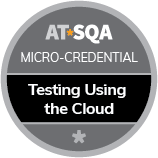AT*SQA Micro-Credentials - Testing Using the Cloud

Testing Using the Cloud Micro-Credential
Testing in the cloud takes advantage of unique testing techniques, advantages, disadvantages, challenges, and tools. Testing in a cloud may be performed on-site, or anywhere with an internet connection and the ability to authenticate into a service provider. Unlike testing internally managed servers and databases, testing in the cloud offers flexibility and possible overhead cost reductions for a software development business.
Learn Testing Using the Cloud through AT*Learn Training
Get the AT*SQA Testing Using the Cloud Body of Knowledge (Syllabus)
Cloud-Based Testing: What QA Teams Need to Know About Testing Using the Cloud
With the swift technological shift towards cloud computing, the process of software testing is also evolving. Cloud-based testing refers to the practice of using cloud environments, resources, and infrastructure to simulate real-world user traffic and environments for testing software applications. As software applications increasingly operate across diverse environments and are accessed by users globally, it's crucial to test these applications under various scenarios and loads to ensure optimal performance and reliability.
AT*SQA's free Testing Using The Cloud body of knowledge and optional AT*Learn training webinar give QA teams basic knowledge about cloud-based testing. Below are key points from the body of knowledge and webinar.
Methods
The principal methods of cloud-based testing are Performance Testing, Load Testing, Stress Testing, Compatibility Testing, and Security Testing. Performance testing evaluates how a system performs in terms of responsiveness and stability under a specific workload, while Load testing analyzes a system's behavior under peak or increasing loads. Stress testing, on the other hand, is performed to understand the upper limits of capacity within the system. Compatibility testing checks whether the software can run in different environments, hardware, operating systems, and network configurations. Lastly, Security testing aims to identify any threats or vulnerabilities within the system.
Benefits
Cloud-based testing offers several notable benefits. Firstly, it provides unparalleled scalability. Traditional testing methods are limited by the capacity of physical infrastructure, while cloud-based testing allows for testing at almost unlimited scales. Moreover, it also offers cost benefits as businesses only pay for the resources they use, eliminating the need for costly infrastructure investments. The ability to replicate real-world user scenarios is another significant advantage, ensuring that the software is robust enough to handle any situation it may face after deployment.
Risks
However, there are also potential risks associated with cloud-based testing. These include security and privacy concerns due to shared resources, potential data breaches, regulatory compliance issues, and dependency on internet connectivity. It is crucial that these risks are thoroughly considered, and appropriate measures are taken to mitigate them.
Best Practices
In terms of best practices for cloud-based testing, the Testing Using The Cloud body of knowledge and the AT*Learn webinar recommend a detailed understanding of the testing requirements and the selection of a suitable cloud provider that can meet these needs. Thorough planning and designing of tests, monitoring the usage of cloud resources, and the use of automation wherever possible are also key to optimizing the process and achieving the best results.
Generally speaking, cloud-based testing is a powerful approach for modern software development, providing scalability, cost-effectiveness, and the ability to simulate real-world user scenarios. It also underscores the importance of understanding and mitigating the potential risks associated with it. With careful planning, risk management, and following recommended practices, cloud-based testing can significantly enhance the quality and performance of software applications.
AT*SQA's free body of knowledge provides helpful insights into the different methods, benefits, and potential risks involved in cloud-based testing. For those who prefer to watch a presentation on Testing Using The Cloud, AT*SQA also offers the $7.99 per month AT*Learn software testing training area.
After you have learned about cloud testing, prove your knowledge with the Testing Using The Cloud micro-credential. Like all of AT*SQA's micro-credentials, upon passing, the micro-credential will appear on your profile in the Official U.S. List of Certified & Credentialed Software Testers™ and give you points toward your Testing Tiers® software tester ranking level.
AT*SQA Micro-Credentials
Agile Testing Micro-Credential AT*SkillStack™
Agile Software Testing Methodologies Agile Implementation Making Agile Work Test ApproachesTesting Essentials Micro-Credential AT*SkillStack™
Testing for IoT and Mobile CyberSecurity Testing DevOps Testing Performance Testing Test Approaches Test Automation Testing Techniques Usability TestingOther Micro-Credentials
API Testing Testing Using The Cloud